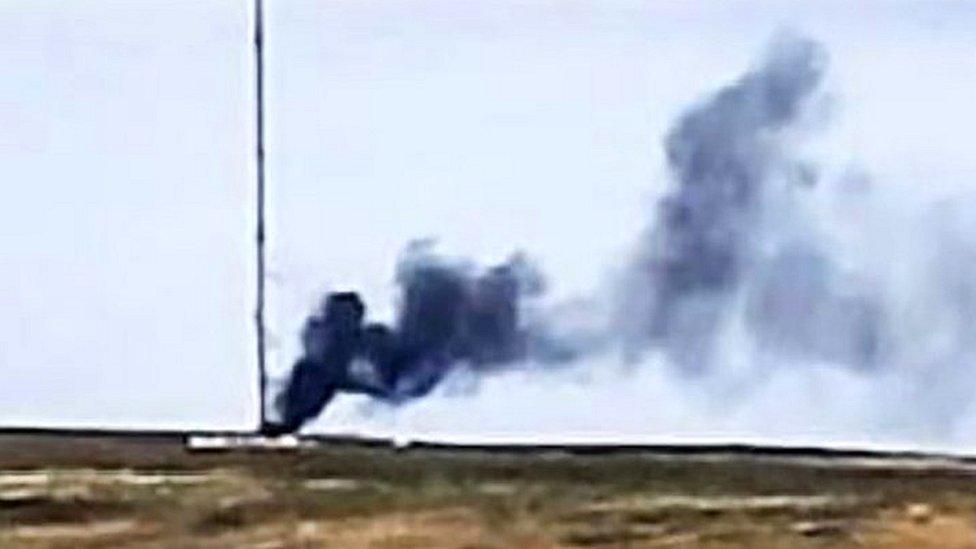Bilsdale transmitter fire: TV and radio for 1m off air indefinitely
- Published
- comments
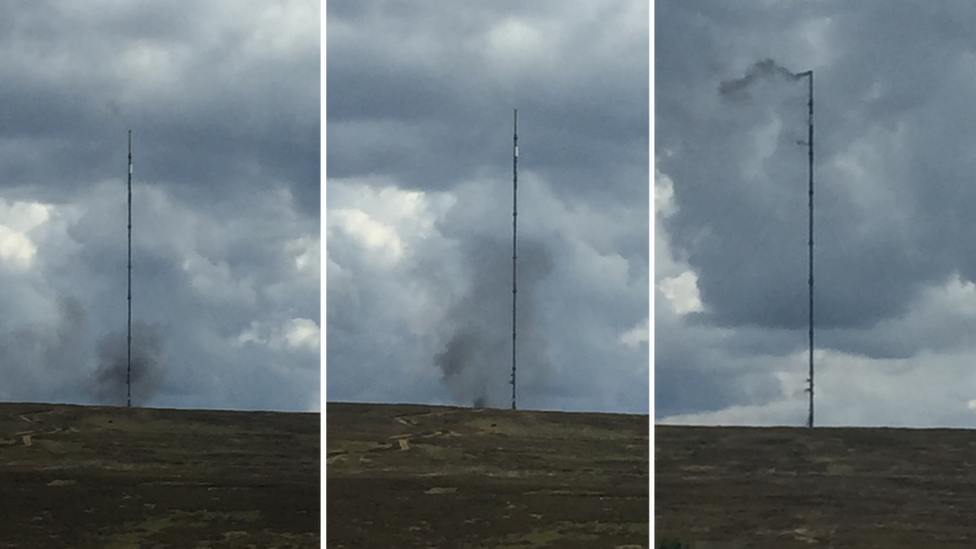
The 1,032ft (315m) tall mast, seen here in three different images, caught fire on Tuesday
TV and radio services for more than a million people will remain off air indefinitely after a transmitter fire.
The blaze at the Bilsdale mast on Tuesday disrupted Freeview, DAB and FM radio signals across North Yorkshire, Teesside and parts of County Durham.
Operator Arqiva said it would bring in temporary equipment but could not say when services would be restored.
Witness Ron Needham, 71, reported seeing "a huge black cloud of smoke come from the buildings at the bottom".
He had been hiking on the North York Moors with his wife Sue, 69, when they stopped for lunch at the base of the mast.
They noticed "nothing untoward" but after continuing for about a mile-and-a-half noticed smoke coming from the top "like a chimney", Mr Needham said.
Despite the loss of transmission from the tower, BBC television remains available on iPlayer.
Radio stations can still be listened to on BBC Sounds.
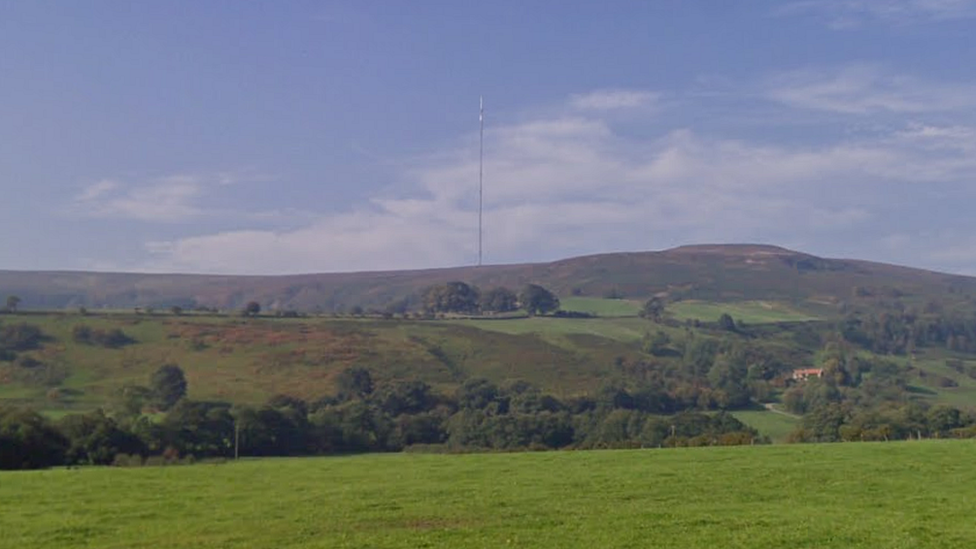
The transmitter mast can be seen for miles around
Firefighters were sent to the site at 13:19 BST on Tuesday after a call from an engineer working on the transmitter near Helmsley.
North Yorkshire Fire and Rescue Service said there were "concerns about the structural integrity of the mast" and a 300m (980ft) exclusion zone was in place around it.
It also said the cause of the blaze was being investigated but did not believe it was as a result of a "criminal act".
Arqiva confirmed no-one was injured in the fire and thanked emergency services "for their swift action".
"We have started the process to gradually restore services using a combination of temporary structures and existing infrastructure elsewhere in the region, and will be moving through this process as quickly and safely as possible," a spokesperson said.
A spokeswoman for North Yorkshire Police said Airwave, the radio service used by all the emergency services, had not been affected by the mast fire.
The 1,032ft (315m) tall tower was built in 1969 and provides coverage for 500,000 homes across northern England, from Tadcaster to Seaham. Arqiva said about 200,000 of those use Freeview as their main TV platform.
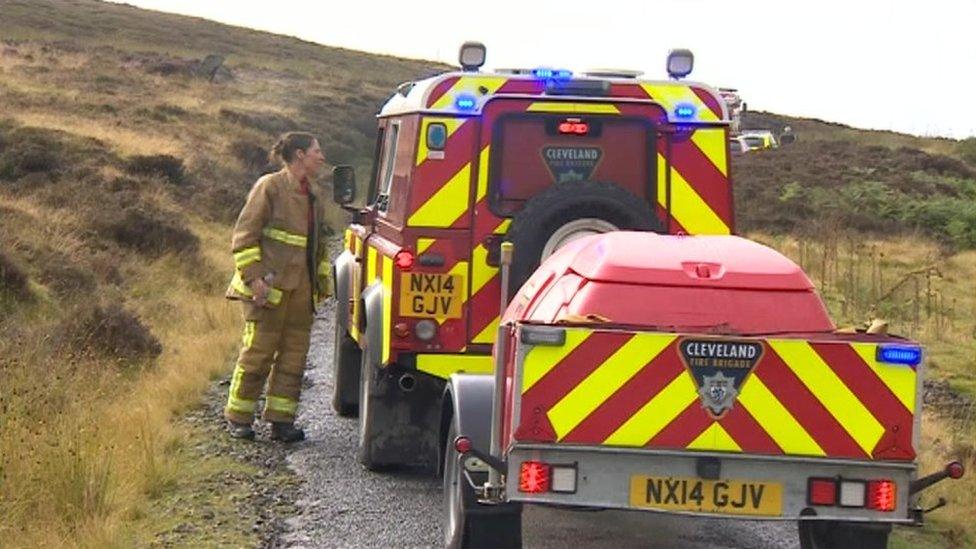
Six fire crews attended the scene to extinguish the blaze
People have contacted the BBC about how the loss of transmission has affected them, with one viewer saying they were "stuck at home with severe disabilities".
"I really relied on this, [there's] only so many books I can read in a day, which I can't hold for long," they said.
Another viewer in North Yorkshire told how their 86-year-old neighbour lived alone and had no broadband.
They said they had fitted a wi-fi extender to their internet and given her their Amazon Fire Stick so she was able to watch television.
"She's OK now, but many elderly people don't have people to help," they said.
The services affected include:
Channels on the PSB1, 2, 3, COM4, 5, 6, 7 and LTV television multiplexes
BBC Radio Tees, BBC Radios 1-4 and BBC DAB
Commercial radio stations SDL, North Yorkshire DAB, BAUER Teesside, Digital 1, TFM, Capital, Heart and Classic FM
Sky, Freesat and cable services are not affected.
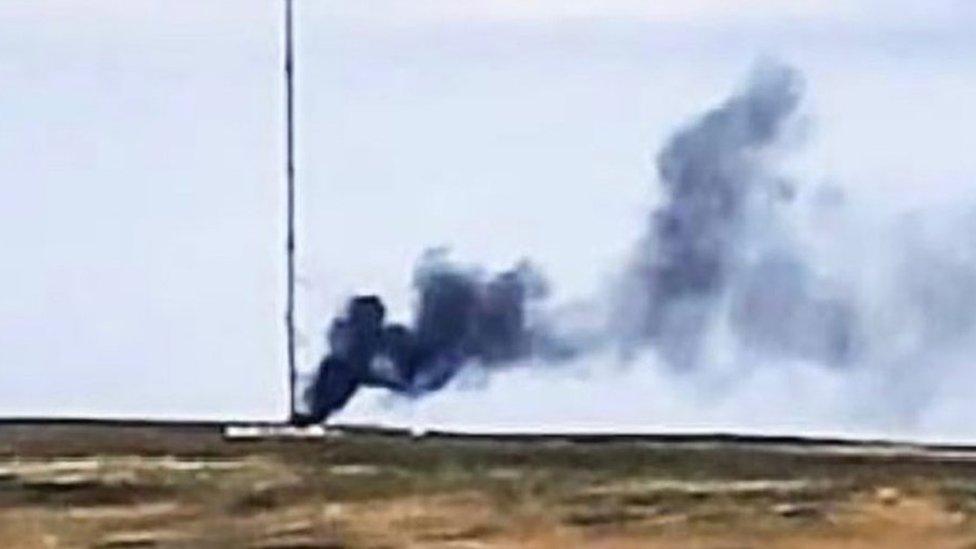
The fire has disrupted Freeview, FM and DAB services
Coverage of BBC Radio Tees on DAB is reduced but some reception should continue for most listeners and there is no need to retune.
BBC Sport Tees's coverage of Middlesbrough's match against Blackpool is also affected.
Allow X content?
This article contains content provided by X. We ask for your permission before anything is loaded, as they may be using cookies and other technologies. You may want to read X’s cookie policy, external and privacy policy, external before accepting. To view this content choose ‘accept and continue’.
BBC Radio York uses Bilsdale to relay its signal and bypassing the mast is resulting in a weaker service.
Listeners to the BBC's national radio services on FM should attempt to retune to a neighbouring transmitter, ensuring aerials are fully extended and placed near windows.

Follow BBC North East & Cumbria on Twitter, external, Facebook, external and Instagram, external. Send your story ideas to northeastandcumbria@bbc.co.uk, external.
Related topics
- Published10 August 2021
